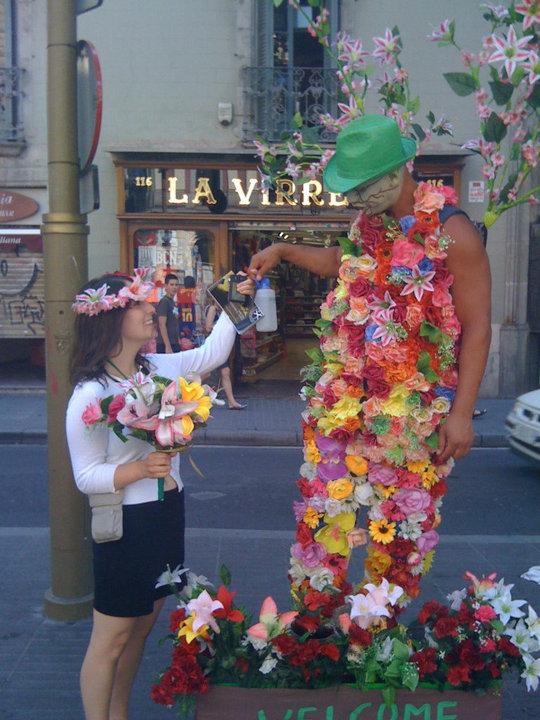In Rome, we met Omar. Despite having never met us before, Omar picked us up from the train station, brought us back to his apartment, cooked lunch for us, and told us that not only could we use anything in his home we needed, but that we could stay as long as we like.
This was a far cry from a few previous nights, when, failing to find a place to stay in the grand, but much-too-expensive city of Monaco, Emma and I were forced to spend half the night in a sea-side bar, and the other half on the city bench next to said bar.
We had gotten in contact with Omar, a 58-year-old photographer and former journalist, a few weeks prior to our arrival in his home city, Rome, through a friend of Emma’s mother. We were more wary of being an imposition than staying in a near-stranger’s home.
However, Omar not only assured us that we were not an imposition, he treated us like royal guests, giving us a key and allowing us complete freedom in his elegant and artistic home. He was an absolute delight and entertained us with stories about his past and about the city he loves.
One of the highlights of our stay was a dinner we shared with Omar and his two friends, Carlo and Antonella. The three of them were warm and engaging, not at all seeming to mind sharing their evening with a couple of American girls.
Emma and I were a bit embarrassed by the fact that we often went to bed when Omar was still out on the town. We probably appeared quite boring to the exciting Italians, but Omar and his guests seemed genuinely interested in our lives. They asked us about our schooling and our families, and they told us about themselves and the Buddhist religion that connected them.
It was, all in all, a perfect night.
We spent a good deal of time with Omar’s son, 20-year-old Thomas. Our relationship with Thomas was initially strained by the fact that he spoke very little English and we spoke hardly any Italian. Conversations were long and difficult, as he carried around an Italian-English dictionary at all times and used it to carefully pick out each word he spoke.
We were tremendously grateful for his tireless effort at speaking English and slightly ashamed that we were too inept at Italian to compensate at all for his work. Despite the language barrier, Thomas was an exceptional tour guide and was more than generous with the time he spent showing us around.
The language difficulties, however, were mostly overcome thanks to the arrival of Marco, Thomas’ best friend.
Marco, complete with long blond hair, black outfits, and white Converse sneakers, bore a striking resemblance to Kurt Cobain, whom, we discovered, was a hero, of sorts, for him.
When Omar first suggested that Thomas show us around the city, we figured that he and Marco would be either far too busy or far too unconcerned with us to want to take the time to be tour guides. We wouldn’t have blamed them. To our surprise, however, the two young men seemed more than happy to take us around Rome.
For a couple of days, they brought us to the most beautiful and historic of Roman sights.
On one night they even showed up at Omar’s to take us for drinks and pastries, and although, during the drive into town, Marco swerved us around the city in his tiny white car and all I could think about was how I didn’t want to die by way of a car accident at the hands of an Italian Kurt Cobain look-alike, the whole evening was a pleasant way to end our stay. We felt thoroughly welcomed by our new Italian friends.
We saw everything you’re supposed to see in Rome — the Colosseum, the Pantheon, the Trevi Fountain, and Italian churches galore — but the people we spent time with separated our trip from those of the thousands of tourists we passed by along the way. It was a personal experience.
The generosity of our Roman friends was unlike anything I had experienced before. It was refreshing, and I have to wonder how many others would go to such lengths to accommodate a pair of travelers such as ourselves.
As Thomas introduced us to his mother, who, besides having so much Italian elegance and charm to make us feel particularly ugly, sloppy and American, extended her own home to us and offered assistance with whatever she could help us with, I was amazed at the willingness our slew of hosts had to make us feel at home.
Travel, I have discovered, is all about connecting — connecting to people who live in a world apart, yet with whom we feel so kindred. In the end, it was not the beautiful views or the historic settings that marked our trip so different from any other, but rather the people with whom we connected.
It was also these people that helped us make such a long trip on such a small budget without any serious injury or identity theft, and for that, I am eternally grateful.
Contact Annie Sciacca at asciacca@theinquireronline.com





































































